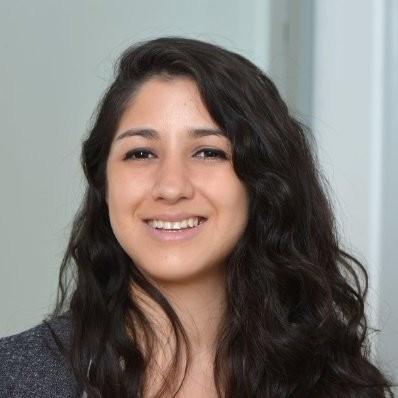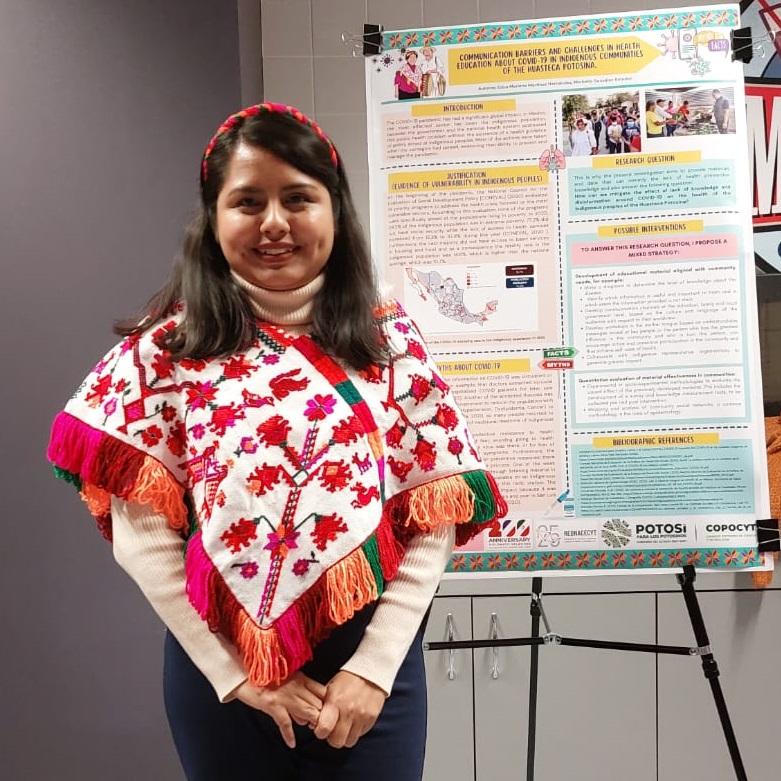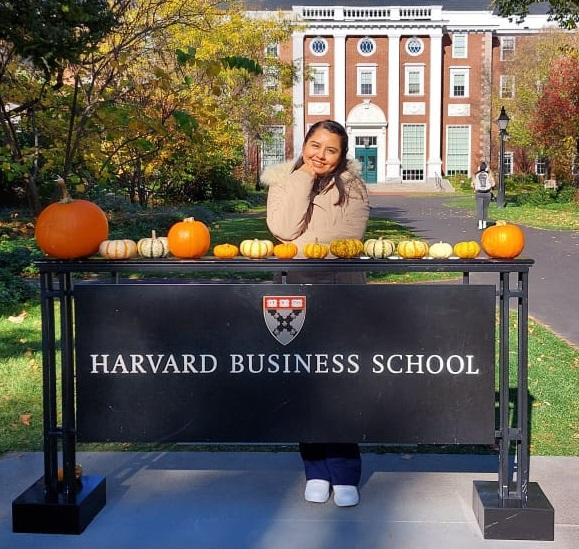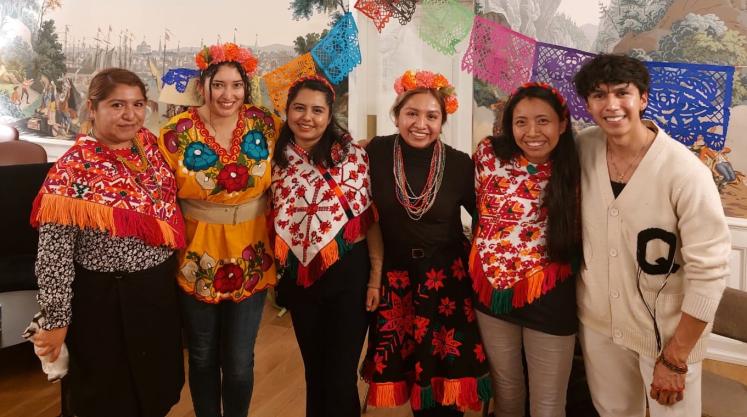
Michelle González Amador - who is currently completing her full-time PhD at UNU-MERIT - has been involved with the multi-institutional initiative Mechanism Design for Social Good (MD4SG) for several years and was previously the organiser of the Latin America and Caribbean Working Group. One of the projects that emerged from this working group was a Summer of Science Program, the goal of which is to support female students from Indigenous communities in Mexico as they design and execute research projects aimed at improving their local communities. The Program has been a great success, with last year's edition taking place at the ACM conference on Equity and Access in Algorithms, Mechanisms, and Optimization (EAAMO'23) conference at Boston University; a series of talks and seminars were also organised by Harvard University for the cohort. The third edition will be held later this year in Mexico, in partnership with the Mexican National Network of Councils and State Organizations of Science and Technology (REDNACECYT) and the Autonomous University of San Luis Potosí (UASLP) in San Luis Potosí, Mexico.
Michelle is a co-organiser and mentor of the Summer of Science Program, alongside her colleagues Dr. Francisco Marmolejo (Harvard), Dr. Tilsa Oré Monago (Rice University), Dr. Rubén Martínez Cárdenas (York University) and Dr. Imelda Flores Vázquez (Econometrica Inc). As a key player in the organising team, Michelle (a Mexican national) has strong ambitions for the project: ''In 2023, we grew exponentially in terms of the number of students and Indigenous communities involved. This year, we're hoping that - as long as we can avoid issues with visas for the US or EU and reduce travel costs - we will be able to grow even further. Whilst we're currently working only with Mexican students, our next goal is to include Peruvian Indigenous women."
Here, we share an interview that Michelle held with her mentee Edna Marlene Martínez Hernández (the original interview in Spanish can be found below). Edna is a student of the Master of Science in Public Health at the Autonomous University of Nuevo León (UANL); her 2023 Summer of Science research project was on the communication barriers and challenges in health education about COVID-19 in Indigenous communities of the Huasteca Potosina.

When did you start wanting to become a scientist, and what did you want to study?
I had my first experience doing research during my bachelor's degree in Nursing. We had a Research Methodology learning unit and in this subject we learned how to develop a research protocol, and prepare scientific posters. We presented the course’s poster at a national congress. One of my goals when finishing my degree was to be able to pursue a specialization, but due to the COVID-19 pandemic, I had to wait a while and it was then that the call for the Program for the Incorporation of Indigenous Women into a postgraduate degree came. It was because of this program that I chose to do a Master's degree in Public Health Sciences at the Autonomous University of Nuevo León, which, unlike the master's degree offered by the UASLP, was focused on research. Through this program, we were invited to participate in the first Summer of Science 2022, which took place in the City of Washington, U.S.A. and to the Summer of Science 2023, in Boston, U.S.A.
Upon completing my master's degree, I would like to continue with a PhD either in the same faculty of the UANL or abroad, equally oriented towards public health.
Who were your role models in this field, and how did you seek to emulate them?
Without a doubt, my role model since the beginning of my Bachelor's degree has been Florence Nightingale, a British nurse, a precursor of modern nursing, who was a woman who brought nursing activities to school spaces, in addition to transforming it from a trade into a profession.
One of her greatest achievements was controlling mortality and morbidity in hospitals caused by infections in the 19th century. Florence Nightingale documented and made known to the entire Ministry of Health in England that if doctors washed their hands, if the infected were isolated from the non-infected, if the rooms were ventilated, death from infections decreased. These simple procedures were documented, generating scientific evidence, for the benefit of the population.
How was your desire to become a scientist received by your family and community?
My mother is very happy and proud of my accomplishments. She has always supported my choices regarding my studies and professional aspirations. Everyone else around me is happy that my community has a professional specialized in the health sector.

What have been some of your biggest learnings while taking part in the Program over the past months?
Thanks to my participation in the Summer of Science Program I was able to develop a research project, involving different methodologies, knowing that these projects can be worked together with other disciplines to enrich and make it more innovative, as well meeting different researchers from internationally recognized universities and sharing my experiences with other researchers in addition to making my research project known, representing my community and being the spokesperson for what is currently happening in our communities. I feel honored to be a representative of Indigenous women.
What have your travels and experiences through the Program shown you about some of your pre-existing expectations about being a scientist?
My experience in Boston has really been very satisfactory. In the conferences held at Boston University I met different researchers from other countries with very interesting projects. From their work, I learned a lot that I think will help me in the future as I develop projects for and in my community. The tour of Harvard University and our participation in the Indigenous Language Revitalization Seminar, by Prof. Américo Mendoza Mori - who is a researcher of Indigenous languages - left me feeling incredibly happy. In addition to sharing my experiences with students of this institution, I also found many students with Indigenous roots, like myself. It has also been great to see the interest students and researchers showed for my culture and Indigenous cultures in general. It is undoubtedly gratifying and at the same time motivating to be able to listen to the life stories of each of my fellow participants who, like me, have faced many challenges to achieve their dreams. This experience has taught me a lot of positive things.
How has being from an Indigenous community affected your work and goals as a scientist, both in terms of challenges and opportunities?
From my perspective, being originally from an Indigenous community, it is easier for me to develop a research project because I know our traditions, our language, our worldview. This facilitates interaction with my community members, so that they do not see me as an outsider who often intimidates them. This limits the researcher’s ability to do their work.
One of my main challenges is that there are few people interested in developing research in these communities due to remoteness, language, etc. and the lack of resources to carry it out is one of the main limitations; however, thanks to my involvement in the Summer of Science Program I have learned a lot of about developing research projects focused on Indigenous communities and how to generate scientific and community interest in them.
How has being Spanish- and Tének-speaking affected your work and goals as a scientist, both in terms of challenges and opportunities?
The fact that I speak my native language Tének I feel gives me greater opportunities to develop research in the communities where this language is spoken, since most people are distrustful of people who come from outside the community as it is not unusual that these researchers projects do not benefit the community where they carry out their research, and fail to inform the community what the purpose of their research is. This is where I consider that carrying out research with an instrument in a community’s native language would greatly enrich the data that can be obtained, but above all allow the research to generate an impact that helps solve at least one of the many existing problems.
Currently one of my barriers is not speaking English, because I feel that it would help me a lot to be able to interact with other people and be able to benefit from the collaboration networks that have emerged in the Summer of Science Program, to carry out my projects.
How do you hope to change the field of science?
I would like to develop research projects that can contribute to closing gaps that still exist in the different Indigenous communities, especially in the area of health. I want to generate knowledge in this domain for my community’s health sector, so that we are better able to recognize the risk factors that trigger different diseases and how these can be prevented. The prevention strategies in Indigenous communities are not usually the same for non-Indigenous communities. I want to be able to identify the reasons why the various strategies and programs that have been implemented in my community have not generated positive results. Above all, I want to generate knowledge to help my community take better care of their health.
Original interview (in Spanish)
¿Cuándo te diste cuenta que te interesaba hacer ciencia, y qué quieres estudiar?
Tuve mi primera experiencia realizando investigación durante mi licenciatura en Enfermería. Tuvimos una unidad de aprendizaje de Metodología de Investigación y en esta materia aprendimos a desarrollar un protocolo de investigación y a preparar pósters científicos. Presentamos el póster del curso en un congreso nacional. Uno de mis objetivos al terminar mi licenciatura era poder seguir una especialización, pero debido a la pandemia de COVID-19, tuve que esperar un tiempo y fue entonces cuando surgió la convocatoria para el Programa de Incorporación de Mujeres Indígenas a un posgrado. Fue por este programa que decidí hacer una maestría en Ciencias de la Salud Pública en la Universidad Autónoma de Nuevo León, que, a diferencia de la maestría ofrecida por la UASLP, estaba enfocada en la investigación. A través de este programa, fuimos invitados a participar en el primer Summer of Science 2022, que tuvo lugar en la Ciudad de Washington, EE. UU., y en el Summer of Science 2023, en Boston, EE. UU.
Al completar mi maestría, me gustaría continuar con un doctorado, ya sea en la misma facultad de la UANL o en el extranjero, igualmente orientado hacia la salud pública
¿Quiénes son tus modelos de rol en la ciencia y cómo has buscado seguir su ejemplo?
Sin duda mi ejemplo a seguir desde inicios de la Licenciatura ha sido Florence Nightingale, enfermera británica, precursora de enfermería moderna. Una mujer que llevó las actividades de enfermería a los espacios escolarizados y la transformó de un oficio a una profesión.
Uno de sus mayores logros fue controlar la mortalidad y la morbilidad en los hospitales causados por infecciones en el siglo XIX. Florence Nightingale documentó y dio a conocer a todo el ministerio de salud en Inglaterra que si los médicos se lavaban las manos, se aislaban los infectados de los no infectados y se ventilaban los cuartos, la muerte por infecciones disminuía. Esos procedimientos tan sencillos fueron documentados generando evidencia científica, en beneficio de la población.
¿Qué piensa tu familia y tu comunidad que estés interesada en hacer investigación científica?
Mi mamá sobre todo está muy felíz y orgullosa de mis logros, es la persona que siempre ha apoyado mis decisiones con respecto a mi carrera profesional y las demás personas se sienten contentos de que en la comunidad exista una profesional en el área de la salud.
¿Cuáles han sido algunos de tus aprendizajes más importantes de haber participado en el programa en los últimos meses?
Gracias a mi participación en el programa de Verano de la Ciencia, desarrollé un proyecto de investigación involucrando diferentes metodologías, sabiendo que estos proyectos se pueden trabajar en conjunto con otras disciplinas para enriquecerlos y hacerlos más innovadores. También conocer a diferentes investigadores de universidades reconocidas internacionalmente y compartir mis experiencias con otros investigadores además de dar a conocer mi proyecto de investigación, representar a mi comunidad y ser la portavoz de lo que actualmente acontece en nuestras comunidades. Me siento honrada de ser una representante de las mujeres indígenas.
¿Qué has aprendido tus viajes y experiencias a través del Programa sobre las expectativas que existen alrededor de los científicos?
Mi experiencia en Boston realmente ha sido muy satisfactoria. En las conferencias llevadas a cabo en la Universidad de Boston conocí diferentes investigadores de otros países con proyectos muy interesantes. Aprendí mucho de su trabajo para poder desarrollar futuros proyectos en mi comunidad. El recorrido por la Universidad de Harvard y nuestra participación en el seminario de revitalización del lenguaje indígena por parte del Prof. Américo Mendoza Mori –investigador de lenguas indígenas– me dejó muy contenta. Además de compartir mis experiencias con alumnos de esta institución y que tienen raíces indígenas como yo. Realmente ha sido gratificante y motivador escuchar las historias de vida de cada una de mis compañeras participantes que al igual que yo han enfrentado muchos retos para poder lograr sus sueños. Me deja con muchas cosas positivas.
¿Cómo ha afectado a tu trabajo y metas como científica ser parte de una comunidad indígena, tanto en términos de desafíos como de oportunidades?
Desde mi perspectiva al ser originaria de una comunidad indígena, me es más fácil desarrollar un proyecto de investigación porque conozco nuestras tradiciones, lengua y cosmovisión. Esto facilita la interacción con los miembros de mi comunidad, para que no me vean como alguien ajeno que muchas veces los intimida. Esto limita la capacidad del investigador para realizar su trabajo.
Uno de mis principales desafíos es que hay pocas personas interesadas en desarrollar investigaciones en estas comunidades debido a la lejanía, el idioma, etc., y la falta de recursos para llevarlo a cabo es una de las principales limitaciones; sin embargo, gracias a mi participación en el Programa de Verano de Ciencias, aprendi mucho sobre cómo desarrollar proyectos de investigación centrados en las comunidades indígenas y cómo generar interés científico y comunitario enfocados a este sector.
¿Cómo ha afectado el hecho de hablar español a tu trabajo y metas como científico, tanto en términos de desafíos como de oportunidades?
El hecho de hablar mi lengua materna, el Tének, me brinda mayores oportunidades para desarrollar investigaciones en las comunidades donde se habla este idioma. Esto se debe a que muchas personas desconfían de quienes vienen de fuera de la comunidad, y muchas veces estas personas no brindan ningún beneficio en la comunidad donde llevan a cabo su investigación y tampoco informen a la comunidad sobre el propósito de su investigación. Aquí es donde considero que llevar a cabo investigaciones con un instrumento en el idioma nativo de la comunidad enriquecería enormemente los datos que se pueden obtener, pero sobre todo permitiría que la investigación genere un impacto que ayude a resolver al menos uno de los muchos problemas existentes.
Actualmente, una de mis barreras es no hablar inglés, ya que siento que me ayudaría mucho poder interactuar con otras personas y beneficiarme de las redes de colaboración que han surgido en el Programa de Verano de Ciencia, para llevar a cabo mis proyectos.
¿Qué desearías cambiar en el mundo de la ciencia?
Me gustaría desarrollar proyectos de investigación que puedan contribuir a frenar brechas que aún existen en las diferentes comunidades indígenas, sobre todo en el área de la salud. Quiero generar conocimiento en este ámbito para el sector de salud de mi comunidad, de manera que podamos reconocer mejor los factores de riesgo que desencadenan diferentes enfermedades y cómo prevenirlas. Las estrategias de prevención en las comunidades indígenas generalmente no son las mismas que en las comunidades no indígenas. Quiero ser capaz de identificar las razones por las cuales las diversas estrategias y programas implementados en mi comunidad no han generado resultados positivos. Sobre todo, quiero generar conocimiento para ayudar a mi comunidad a cuidar mejor su salud.

